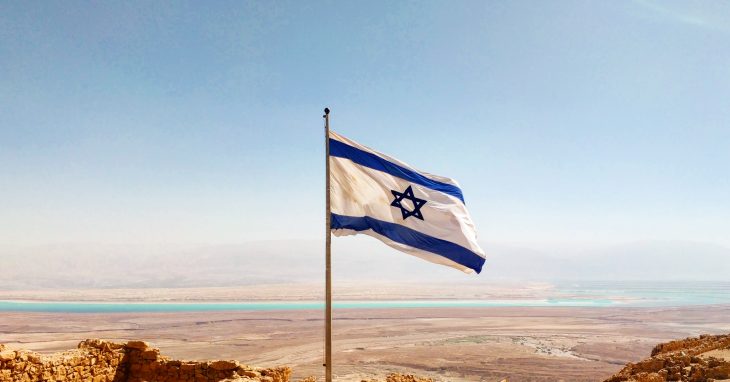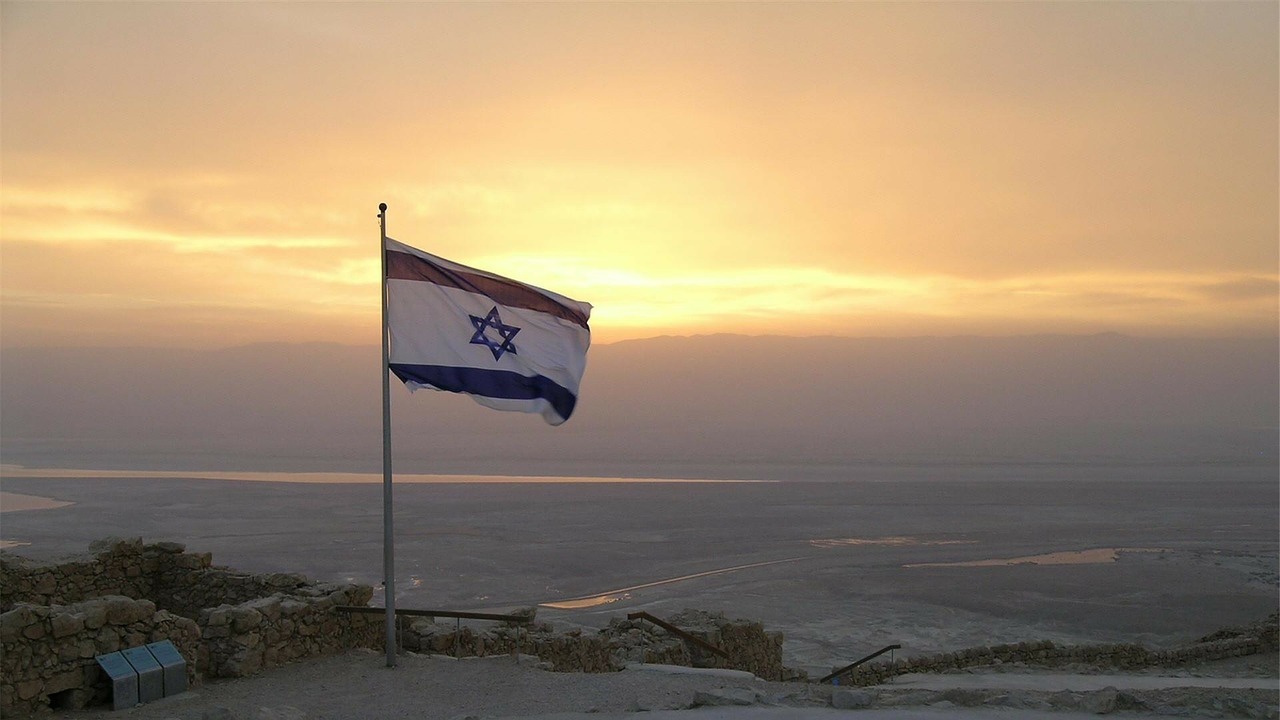
Known for being the holiest country in the world, Israel holds centuries of history for religious faith. In particular, Israel is home to numerous archaeological and religious sites considered sacred by Jews, Christians, and Muslims. However, there’s more to it than its holy roots. Throughout the world, Israel excels in fields such as technology and agriculture. Find out more about the highlights of this country with these Israel facts.
- Israel has 4 neighboring countries – Syria in the northeast, Jordan on the east side, Lebanon on the north, and Egypt on the southwest.
- As of the year 2020, the country’s current population is more than 8.5 million.
- The country’s gross domestic product reaches 340 billion USD.
- Compared to its bordering countries (except for Egypt), Israel’s gross domestic product or GDP is roughly 6 to 7 times bigger.
- Israel’s area code is +972.
- The country is officially known as the State of Israel.
- Israel is a country in Western Asia.
- Jerusalem is Israel’s capital.
- Israeli Shekel is the country’s currency.
- The official language of Israel is Hebrew.
- The country lies on the northern shore of the Red Sea and the southeastern shore of the Mediterranean Sea.
- Hebrew and Arabic are the languages that are spoken by the common population of Israel.
- Arab teachers in school teach the Hebrew language while the Arabic language is used by minorities of the region.
- Israel once used the English language as its official language.
- The country’s time zone is GMT+2 for Israel Standard Time and UTC+3 for Israel Summer Time.
- Tel Aviv serves as the country’s technological and economic center.
- Tel Aviv is Israel’s most populous city in the Gush Dan metropolitan area.
- Jerusalem is disputed by diplomatic practice and international law, with both Palestinians and Israelis claiming Jerusalem as their capital city.
- The Jerusalem dispute is one of the most deep-seated issues in the conflict between Israel and Palestine.
- The country has evidence of the earliest migration of hominids outside Africa.
Israel has the most number of technicians and scientists in the world per capita.
Although Israel has a small population compared to other industrialized nations across the globe, the country has the highest number of technicians and scientists per capita. With 140 technicians and scientists for every 10,000 employees, Israel has more scientists than Japan and the United States.
Due to the country's state, Israel is susceptible to pollution.
One of the sad Israel facts is its vulnerability to environmental challenges such as pollution. Because of its limited area, high population growth, semi-desert climate, and limited resources, Israel has faced a declining environment.
For instance, the growing population resulted in an increasing demand for drinking water. The same goes with industrialization, as it contributes to the increase of greenhouse gas emissions and air pollutants.
Israel faced the Six-Day War on June 1967.
Starting on June 5th, this war stemmed from conflict between the Arab and Israeli, involving the nearby countries such as Egypt, Syria, and Jordan. Concluding on June 10th, Israel emerged triumphant due to its preparedness and established strategy.
Historic records reveal that Canaanite tribes have existed since 2000 BC.
The Canaanite tribes were a Semitic civilization that lived in the Ancient Near East. According to archaeologists, they settled in the region as early as 2000 to 3000 BC. During this period, ancient civilizations started to produce bronze by smelting copper and alloying it with tin, arsenic, and other metals.
Some parts of Lebanon, Syria, Jordan, and Israel are the modern Canaan.
According to ancient records, the land of Canaan may have included parts of modern-day Israel, Jordan, Syria, Palestine, and Lebanon. Most of what scholars learned about the Canaanites came from the real accounts from its people that they came into contact with.
The Kingdoms of Israel and Judah started as early as the Iron Age.
The Kingdoms of Israel and Judah started as early as the Iron Age. During this period, people started to forge tools and weapons made of iron. When King Solomon died around 931 BC, the kingdom split into a southern kingdom (Judah) and a northern kingdom, which retained the name Israel.
The oldest proof of early people was in Ubeidiya.
The oldest proof of people living in the territory of modern Israel traces back to Ubeidiya near the Sea of Galilee around 1.5 million years ago. An archeological site of the Pleistocene, Ubeidiya preserved traces of one of the earliest migrations of the Homo erectus out of Africa. Now, there’s one for cool Israel facts.
The Sea of Galilee is the lowest freshwater lake on earth.
Also known as Lake Tiberias or Kinneret, the Sea of Galilee holds the distinction of being the lowest fresh lake in the world. Furthermore, the Sea of Galilee only comes second to the Dead Sea as the lowest body of water on the planet.
There are no fish or plants in the Dead Sea.
The Dead Sea borders Israel and the West Bank to the west and Jordan to the east. The Dead Sea is among the most interesting natural phenomena in the world. True to its name, fish and plants cannot thrive in its waters because of its high salt concentration of 33.7%, which is more than 8 times saltier than ocean water.
The Dead Sea is a "natural spa."
The Dead Sea is an extremely popular destination for local and international tourists. Due to its high salt and mineral content, people claim that the sea has natural healing properties that can treat skin problems like psoriasis, cellulite, and acne. Aside from skin conditions, the Dead Sea’s waters also has therapeutic properties for arthritis and muscle strains.
Israel's land area is 22,145 km².
Israel’s land area covers a total of 22,145 km². In comparison, the state of New Jersey in the United States is about 22,608 km². That said, Israel and New Jersey roughly have the same land area.
Israel's standard of living is higher in contrast to most countries in the region.
The country ranked 19th on the 2016 UN Human Development Index which signifies a “very high” development. Israel is considered a high-income country by the World Bank and also has a very high life expectancy at birth. The country’s standard of living is remarkably higher compared to most countries in the region. Definitely one of the more promising Israel facts.
The average salary in the country is about $2,580 per month.
According to Israel’s Central Bureau of Statistics, the average salary in the country is about $2,580 per month. Additionally, the average income for a family with two wage earners is around $3,500 per month. Compared to nearby countries with a minimum wage of $500 to $800 per month, the average Israelis undoubtedly earn more.
The diamond industry largely benefits Israel.
In terms of economy, Israel earns the most from its industrial manufacturing and technology industry. When it comes to raw materials, Israel’s diamond industry is one of the most dominant in the world. In total, Israel produces 12% of the world’s diamond production.

Israel leads the world in agricultural technology.
Although the country is relatively poor in natural resources due to its geography, the country is still a major exporter of fresh produce and a world leader in agricultural technology.
Israel produces important field crops such as corn, sorghum, and wheat. Along its Mediterranean coastal plain, Israel also bears kiwifruit, mangoes, citrus, avocados, guavas, and grapes.
Israel can produce up to 95% of its own food requirements.
Although Israel’s farmworkers only comprise 4% of its workforce, Israel produces 95% of its own food needs. According to the Agriculture Ministry, the country sufficiently produces enough poultry, eggs, fruits, and vegetables for its people. Because of this, the country honors its agricultural workers for maintaining the country’s nutritional security.
The dairy business is also overwhelming in Israel.
Israeli cows produce the highest amount of milk per animal in the world. By taking advantage of Israel’s advanced agricultural technologies, their cows even outperform cows in United States, Japan, the European Union, and even Australia. Because of this, dairy farmers from countries such as Italy and India learn how to increase their yields by visiting Israel.
Israel faces water shortages as a major challenge.
Typically, Israel experiences rain between April and September, falling unevenly across the country. Ranging from 70 cm or 28 inches in the north to less than 2 cm or 1 inch in the south, the uneven distribution of rain causes water shortages for some areas. Although Israel has an annual renewable water resource of about 5.6 billion cubic feet, 75% of that reserve goes to agriculture.
The National Water Carrier is the largest water project in Israel.
Most of the country’s freshwater sources fall under the National Water Carrier. The National Water Carrier distributes water from the Sea of Galilee Northern Israel to its populated areas.
Israel heavily depends on oil importation.
The country’s supply of petroleum mostly comes from former Soviet nations. Israel gets it from the Baku-Tbilisi-Ceyhan or the BTC pipeline, connecting the Caspian Sea with the Mediterranean.
Israel's natural gas can be a game-changer.
According to research, Israel’s near-total dependence on energy imports may finally end due to its large natural gas reserves. The country started producing natural gas from its own offshore gas fields in 2004. Moreover, around 2017, Israel started its export of natural gas to the Kingdom of Jordan.
Many believe that Israel has nuclear weapons.
Based on reports, the country is believed to own at least 100 plutonium-based nuclear warheads. That said, Israel can use them in various methods such as aircraft and submarine-launched cruise missiles. Now, there’s one for controversial Israel facts.
No one knows for sure if Israel has nuclear weapons.
Although many believe that Israel has a ton of nuclear weapons, the country maintains a policy of deliberate ambiguity and practices anonymity on certain aspects of its foreign policy. Israel never officially denied nor admitted to having the said weapons.
Israeli Defense Forces have the same ranks in all services.
The Israeli Defense Forces (IDF) has a very distinct rank structure. In general, the Israeli Defense Forces’ integrated force have the same ranks in all services. Meaning, there is no differentiation between its ground forces, air force, army, and navy.

The country ranks 4th in the world in scientific activity.
Aside from agriculture, Israel also leads the world in the field of scientific activity. In total, the country publishes scientific articles at a rate 8 times higher than the rest of the world.
Israel has around 8.7 million citizens.
Israel’s population is relatively small, with only around 8.7 million people. This amount is only equivalent to about 0.11% of the total world population. With that, the median age in the country is 30.5 years.
On the 14th of May 1948, David Ben-Gurion has established Israel.
Jewish Agency Head David Ben-Gurion declared the independence of the State of Israel on May 14th, 1948. On the same day, U.S. President Harry Truman acknowledged Israel as a nation. A year prior to the declaration, a civil war raged in the country. This history prompted Ben-Gurion to decree mandatory military training for Israeli men and women.
Israel Electric Corporation is one of the largest industrial companies in the country.
The Israel Electric Corporation (IEC) is the largest biggest provider of electrical power in the country, running an effective monopoly on power generation. Headquartered in Haifa, Israel, the IEC maintains, builds, and operates sub-stations, and power generation stations. That said, the corporation also leads the transmission and distribution of power networks in the country.
The defense industry is one of the biggest employers in Israel.
The defense industry in Israel largely boosts the country’s employment rate. As one of the world’s major exporters of military supplies, Israel represents around 10% of the world’s total military exports. Companies such as RAFAEL, Israel Aerospace Industries, and Elbit Systems are the industry’s biggest suppliers.
Football is the most popular sport in the country.
Football and basketball are the two most popular sports in the country. Internationally, Israel has competed actively in these chosen sports. Currently, the Israeli national basketball team has won 1 silver medal at the European Championship and 2 gold medals in the Asian Games.
Furthermore, the Israeli national football team has bagged the AFC Asian Cup. For the Olympics, Israel has won over 8 medals over the years.

The national dish of Israel is falafel.
A falafel is a crispy ball of fried chickpeas with spices. If you plan to travel to Israel and have not tried one, falafels can be found in restaurants and street corners around the country.

Cholent is a traditional Jewish stew.
Another traditional Israeli dish, this stew combines beef, potatoes, beans, and barley. Usually prepared by simmering overnight for 12 hours, Israelis commonly serve cholent for lunch on the Sabbath. The stew was traditionally cooked over the centuries to honor the Jewish laws that prohibit cooking on the Sabbath. Thus, people usually prepare the meal on Friday before the Sabbath starts.
Israelis commemorate the Biblical history of the Creation through the Sabbath day.
The Sabbath refers to Judaism’s day of rest on the seventh day of the week. During this day, Jews commemorate the Biblical history of the Creation of the earth in six days. With its largely Jewish following, you can expect to see most establishments respecting the Sabbath in Israel.
The Jewish people are an ethnoreligious group.
Ethnoreligious groups refer to ethnic groups whose members are united by a religious background. Historically, the Jewish people originated from the Hebrews and Israelites.
The word Jew, Israelites, and Hebrew are close synonyms.
In general, the terms Jews, Israelites, and Hebrews describe the same people. According to the Bible, these people came from Abraham through Isaac and Jacob when God gave them a promise in the Old Testament.
Most of the Jewish people today live in Israel and the U.S.
Spread out in over 20 countries, most of the Jewish people today reside in Israel and the United States at a population of 12 to 15 million. Outside these countries, around 600 thousand Jews live in France, while 500 thousand live in Canada.
Israel is a Hebrew word that means "wrestles with God".
One of the more interesting Israel facts is that its name comes from the term ‘Yisra’el’, which translates to “wrestles with God” or “contended with God.” In the Bible, God gave this name to Jacob, Isaac’s son and Abraham’s grandson. God changed Jacob’s name to Israel after the night he wrestled with God. Eventually, his offspring adopted the name, which produced the nation itself.
Israeli engineers developed the first cell phone.
Founded in 1928, the American company Motorola owed most of its initial cell phone development from the Israeli Research and Development Department. Since Israeli engineers developed the original cell phone technology, the country has been branded the “Father of Smartphones.” In 1973, Motorola launched the very first cell phone, which eventually made way for today’s modern smartphones.
Waze was developed by an Israeli.
Coming from a disappointing experience with existing GPS systems, Ehud Shabati developed Waze in 2006. In contrast to the traditional GPS system only leads your way to your destination, Waze provides better alternative roads to avoid traffic and other road hazards. In 2013, Google acquired Waze for $1 billion.
Check Point Software Technologies from Israel developed the Firewall.
Aside from smartphones, Firewall software also came as one of Israel’s technological milestones. A team of Israeli computer scientists from Check Point Software Technologies made it possible in 1993. Since then, this system helped millions of internet users to have extra protection from malicious cyber activity.
Check Point Software Technologies is headquartered in Tel Aviv, Israel.
Check Point Software Technologies now serves as an American-Israeli multinational software and hardware provider that specializes in data security management. Check Point Software Technologies is also now a publicly-traded company as part of NASDAQ-100 Component.
“Kosher” is the food that complies with the dietary standards of traditional Jewish law.
Kosher foods are the “food standards” in the Jewish dietary regulations which came from the Bible. For instance, the law permits eating only land animals that chew their cud and have cloven hooves such as ox, sheep, goat, deer, and gazelle. As a result, most people in Israel follow these kosher standards in their diet.

Israel has over 200 museums.
The country has the most number of museums per capita than any other country on the planet. Some of these museums you don’t want to miss are the Tel Aviv Museum of Art, Israel Museum in Jerusalem, Yad Vashem, Museum on the Seam, and Madatech in Haifa.
The tourism industry in Israel continues to grow.
Around 4 to 4.5 million tourists visit Israel each year. Compared to the 2016 statistic of only 2.5 million visitors, Israel has experienced a gradual increase in tourism. According to the Central Bureau of Statistics, these numbers may only continue to rise.
Tel Aviv is the country's 2nd most populated city in Israel.
Known as the “Non-Stop City,” Tel Aviv gained a global reputation for its nightlife environment along with its growing population. After Jerusalem, Tel Aviv is the country’s 2nd-most populated city. Aside for its nightlife, the National Geographic has also ranked Tel Aviv as the 9th-best beach city in the world.

Tel Aviv has good restaurants.
Founded in the year 1909, Tel Aviv is also the first modern Hebrew city. Interestingly, “The Non-Stop City” does not only specialize in technology, but also in sushi restaurants.
With more than 100 sushi restaurants, it surpasses New York City and Toyko per capita. Even more, the Italian government awarded Tel Aviv for having the best foreign Italian restaurant. Definitely one of the Israel facts you’d want to taste for yourself.
Jerusalem has fought more than 100 battles.
Founded as the City of David in 1010 BC, Jerusalem, “The Holy City” has been conquered more than 35 times throughout history. Facing the Romans, British Empire, Persians, and the Ottomans, Jerusalem has went to war over 100 times since its establishment.
Judaism is the country's most dominant religion.
In terms of religion, Israel mainly practices sects of Judaism, such as Judaism-Hiloni at 40%, followed by Judaism-Masorti at 23%, Judaism-Dati at 10%, and Judaism-Haredi at 9%. Other religions in the country include Islam at 10%, Christianity at 5%, and Druze at 2%. Meanwhile, 1% of the population does not practice any faith.
Israel Hayom is the national daily newspaper and news website in Israel.
First published in late July 2007, this Hebrew newspaper is the most widely read newspaper in Israel. During its first launch, this newspaper only released issues on weekdays. Two years later, they launched the weekend edition in October 2009.
The nickname of Israel Hayom comes from the name of Israel's Prime Minister.
To locals, the Israel Hayom publication is known as Bibiton. It combines the word Bibi from Prime Minister Benjamin Netanyahu’s nickname, and Iton from the Hebrew word for newspaper.
Benjamin Netanyahu is Israel's Prime Minister.
In history, he has served the longest term of any Prime Minister of Israel. He served from 1996 to 1999 and 2009 up to the present. Netanyahu also works as the Chairman of the National Liberal political party ‘Likud’. Born in Israel and raised in Philadelphia, Netanyahu returned to Israel after the Six-Day War to join Tzahal or the IDF.
The first king of Israel was a shepherd from Gibeah.
Saul was the first king of the United Kingdom of Israel, leading the nation around 1037-1010 BC. According to historical accounts, Saul possessed good characteristics such as determination, courage, and passion.
Initially, Saul was a good king.
Known for being generous in his leadership, Saul was admired and respected by his people. However, he became impulsive after his jealousy of David drove him into madness. According to the Bible, King Saul opposed God’s instructions, assuming that he knew better.
Israel does not have a king anymore.
As of today, Israel’s government falls under the authority of a President, elected to a 7-year term by a majority of the Knesset through a secret ballot. After completing their first term, Israel’s president can be re-elected for another consecutive term.
Chaim Weizmann was the first President of Israel.
Chaim Weizmann served as the first President of Israel from February 17th, 1949 until November 25th, 1951. So far, the country only had 10 presidents.
The flag of Israel is the Star of David.
One of the interesting Israel facts about its flag is that it is also known as the Zionist flag. The six-pointed Star of David symbolizes Judaism and the Jewish people. The flag’s six points represent the six days of creation as well as the six characteristics of God such as majesty, power, love, wisdom, justice, and mercy. Its stripes signify the stipes on a tallit, a prayer shawl worn by religious Jews. Meanwhile, the blue color signifies God’s purity, glory, and severity.

Was this page helpful?
Our commitment to delivering trustworthy and engaging content is at the heart of what we do. Each fact on our site is contributed by real users like you, bringing a wealth of diverse insights and information. To ensure the highest standards of accuracy and reliability, our dedicated editors meticulously review each submission. This process guarantees that the facts we share are not only fascinating but also credible. Trust in our commitment to quality and authenticity as you explore and learn with us.
